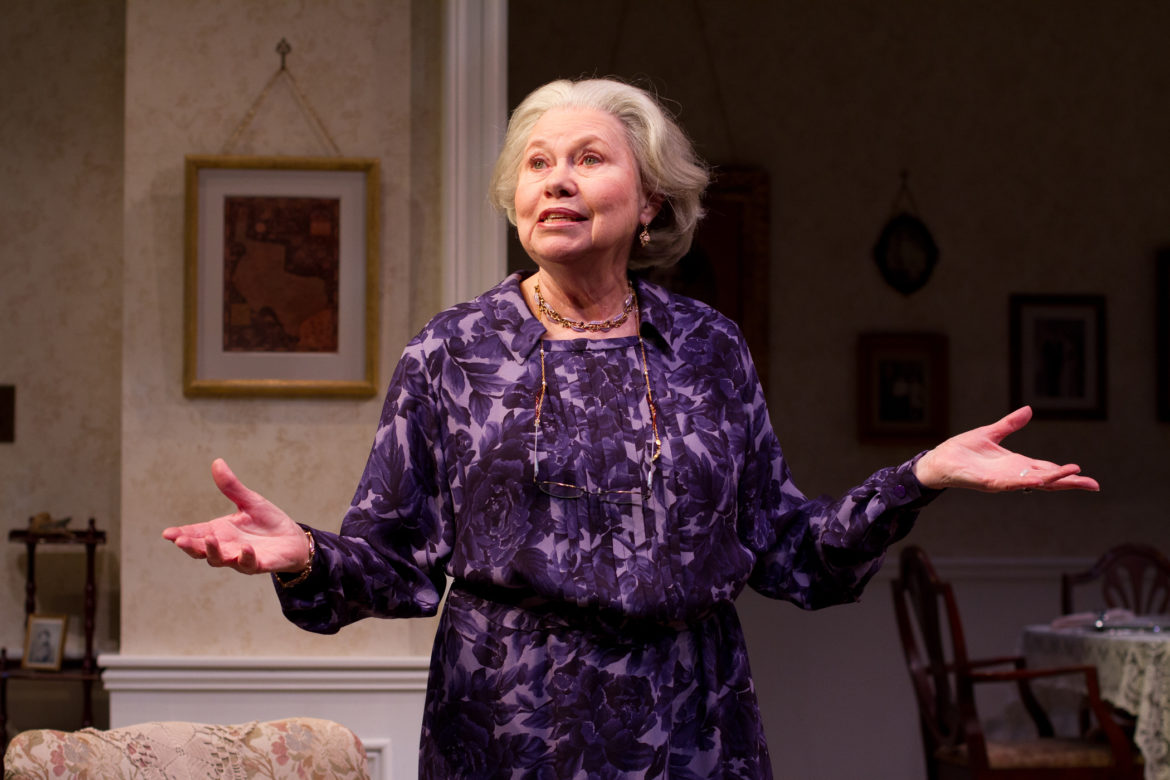
Carla Belver as Stella Gordon in Horton Foote’s DIVIDING THE ESTATE at People’s Light & Theatre. Photo by Mark Garvin.
You might think you’re in familiar territory when you first meet the Gordons, the family that’s wrangling over the titular issue in Horton Foote’s DIVIDING THE ESTATE. If you’re a theatre buff, you’ll hear echoes of Tennessee Williams in the way the characters address each other with a courtly formality barely masking (and more often, failing to mask) years of resentment. If you go deeper into theatre history, as the People’s Light & Theatre dramaturges have, you can spot the parallels between Chekhov’s accounts of the displacement of a non-working class of people in changing economic conditions and what happens to the Gordons in the Texas of 1987, where Foote’s play is set. All well and good, you might say, but that doesn’t guarantee an entertaining evening of theatre. So I’ll close this paragraph by noting that People’s Light & Theatre’s production of DIVIDING THE ESTATE is most definitely an entertaining evening of theatre, mainly because we’re in the hands of master storytellers.
The principal master storyteller, of course, is Foote himself, a spry 72 when the play was first produced in 1989 (he was still active until his death 20 years later), and supremely confident in his craft. For Foote knew what all great storytellers know—chances are you’ve heard the story before, or some variation of it (family members bickering over money and property), but what keeps you watching and listening are the people in the story—what are they going to do about it, and what are they going to do next? Foote was also brave enough to demand patience from his audience. He’s rather like the old uncle who knows everybody’s family history, and whose stories lead to side stories and reminiscences that gradually build in power until we’re completely invested in everybody involved. And we realize that catastrophe can strike not with the thunder of melodrama, but with the quiet casualness of sipping tea with your dinner (something Chekhov also knew). The one storytelling misstep I could point out is at the end—I’d say Foote overshoots his ending by a minute or two, perhaps because sometimes storytellers want to visit with their characters a little bit longer.
![Estate+11[1]](http://stagepartners.org/wp-content/uploads/2011/05/Estate+111-200x300.jpg)
Kathryn Petersen as Mary Jo and Greg Wood as Bob in Horton Foote’s DIVIDING THE ESTATE at People’s Light & Theatre. Photo by Mark Garvin.
Just as there are many ways to get Chekhov wrong (if you’ve ever dozed through an evening of Chekhov, you’ll know what I mean), the denizens of Foote’s Harrison, Texas could be just as ill-served in the wrong hands. I’m happy to report that director Abigail Adams and her cast and crew prove more than capable of telling Foote’s story in a way that seems as natural as breathing. Adams gives us time to appreciate how the Gordons’ house (well-designed by Tony Straiges) tells us part of the family history, and how the characters’ costumes provide all kinds of details in terms of who and where these people are (the just-right costumes were designed by Colleen Muscha).
As for the actors, they form such a vital ensemble that I think you’re going to be convinced that you’re just seeing a family of real, flawed, and sometimes annoying people going at each other (and Foote gives them plenty of good reasons for going at each other). Every member of the company deserves more praise than the limits of a thesaurus will allow me, but I will mention that Christian Pedersen as the stalwart and hard-working Son reveals the layers of conflict beneath his good-boy work ethic; Carla Belver, as Stella, proves a formidable and vulnerable family matriarch; Graham Smith finds the sincerity and dignity in the sinning and dissolute Uncle Lewis; Greg Wood finds unexpected grace notes in the one-track-minded brother-in-law Bob; Amy Hutchins lets us see the hints of frustration and resolve lurking beneath Pauline, Son’s fiancée; Marcia Saunders and Kathryn Petersen have at it with gusto as the feuding sisters Lucille and Mary Jo; and Cathy Simpson and Aimé Kelly are strong presences as two African-American servants who remind the family (and us) that they are also real people with their own agendas. Lou Ferguson, as Doug, the ancient African-American manservant who helped raise Stella, is probably the most overtly Chekhovian presence in the play, and perhaps the most troubling presence as well. Ferguson’s integrity and commitment force us to confront the contradictions and pain of a black man whose lifetime of service to a white family encompasses pride and shame, ignorance and wisdom, and generations of racial condescension and stereotyping. Foote, as well as People’s Light, is smart and skillful enough not to preach that to us—it’s just part of the overall story, and the servant Doug is just one of the people in it. I’d advise you to make this excellent production a part of your own life-story as well.
DIVIDING THE ESTATE
by Horton Foote
Directed by Abigail Adams
May 11-June 5, 2011
People’s Light & Theatre
39 Conestoga Road
Malvern, PA 19355
610-644-3500
www.peopleslight.org


